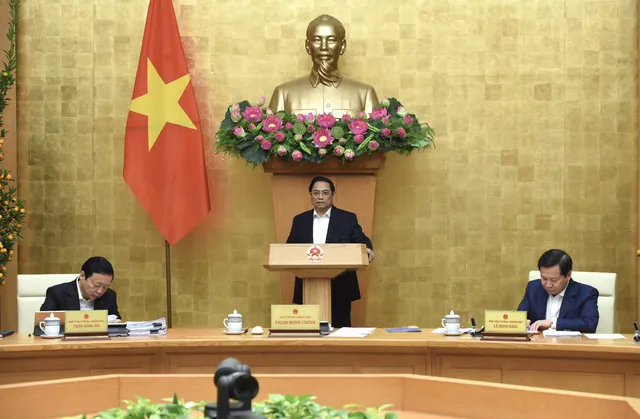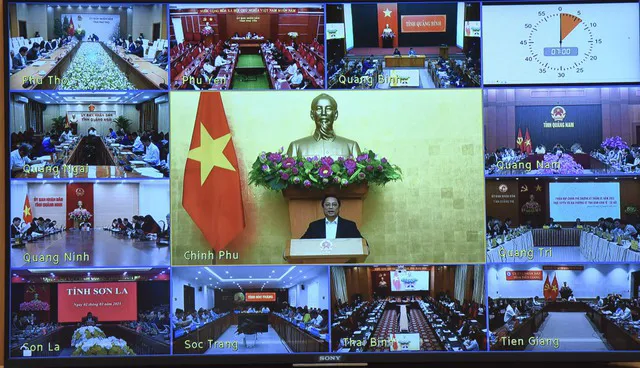Vietnam prioritizes macroeconomic stability in 2023: PM
The country is forecast to be the second-fastest growing economy in Asia-Pacific this year.
Vietnam would continue to prioritize macroeconomic stability and containing inflation in anticipation of greater challenges from both domestic and international fronts in 2023.
| Prime Minister Pham Minh Chinh at the meeting. Photos: VGP |
Prime Minister Pham Minh Chinh gave the remarks during a monthly Government meeting today [February 2].
According to Chinh, Vietnam’s socioeconomic performance in January has been positive with strong results in all fields and sectors, especially in industries, agriculture, and tourism.
The World Bank in its latest global economic outlook report forecast Vietnam’s GDP in 2023 at 6.3% year on year, down 0.2% from the previous assessment, but still the second highest in Asia-Pacific.
In addition to economic development, the authorities have taken measures to ensure social welfare and provided financial support for 25 million eligible social beneficiary people with nearly VND9.5 trillion ($405.1 million).
“Public order is maintained, especially with the strict punishment against those using alcohol when driving, leading to a safe and peaceful environment for the people,” he added.
However, Chinh expressed concern about the challenges still facing the economy, such as increased global geopolitical tension, lack of corporate access to credit, and the difficult environment surrounding the corporate bond and real estate markets.
Meanwhile, progress in implementing the socioeconomic recovery program has fallen behind schedule.
| Overview of the meeting. |
For the coming months, the Government leader called for greater efforts in stabilizing the macroeconomy and containing inflation.
Ministries and agencies are tasked with monitoring global and domestic situations to propose timely solutions for socioeconomic development if needed.
“Monetary policy should be conducted flexibly and actively, staying in line with fiscal and other Government policies,” Chinh stated.
He stressed the necessity for Government agencies to ensure liquidity and the safety of the banking sector while tightening credit management in fields of high risk.
"It is essential for the economy to eliminate bottlenecks in the real estate sector, for which banks must continue to lend to well-performing projects with a clear legal status," he said.
The prime minister urged ministries and localities to promote efficiency in state budget management, with a focus on socio-economic infrastructure projects of national priority.
In this regard, Chinh requested each province/city to stay active in disbursing public investment funds, seen as a key solution to support economic growth.
Among ways to promote economic development, he called for measures to stimulate domestic consumption of local products and services, at the same time facilitate trade and expand export markets via the free trade agreements (FTAs) that Vietnam is a part of.
The agricultural sector, which in recent years has been the backbone of the economy, must continue to apply high technologies in the production process in order to achieve sustainable development and expand exports of farm produce.
Ministries are required to propose measures to enhance innovation and higher productivity in the economy, especially new legal frameworks to accelerate digitalization, new business model creation, and innovative startups.
“Administrative reform remains a key task for Vietnam to continue to improve its business environment,” Chinh stated, expecting greater efforts to promote e-Government, digital Government, citizen, and economy.













